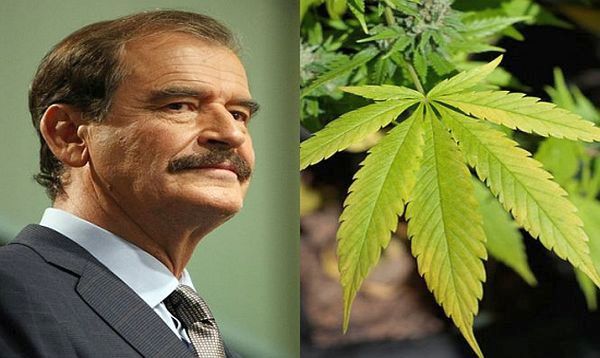Mexico City, Mexico ó Ex-President Vicente Fox has been on the campaign trail ever since he left office in 2006 ó not for re-election, prohibited in Mexico, but to legalize marijuana.
He has promoted regulating a marijuana market and decried the drug war. This year, he has stood alongside former Microsoft executive Jamen Shively as he marketed a plan to operate a chain of "premium" pot dispensaries to serve a market Shively estimates could top $200 billion in the US alone. And as if Fox could envision the profit margins of being a supplier to such a chain, he declared in June that when itís legal, heíll grow it.
"Iím a farmer, I can do it," said Fox, who owns a ranch in Guanajuato state.
Foxís opinion ó once an outlier in conservative Mexico ó has lately been garnering high-level support here. Two former presidential cabinet secretaries spoke out this summer in an op-ed in The Washington Post in favor of legalizing marijuana first in Mexico City as a prelude to a serious national debate. They join one of Mexican intellectual Hector Aguilar Camin and anti-crime activist Maria Elena Morera to push for change in the capital.
"Decriminalization of marijuana is not a silver bullet," wrote the two former cabinet secretaries, Fernando Gomez Mont and Jorge Castaneda, last month in the Post. "But it would be a major step away from a failed approach. Mexico City is the place to start, thanks to the example set in Colorado and Washington state."
Mexico City lawmakers have spent the month debating the merits of legalizing marijuana and other drugs; the debate culminates in a final forum in September. Itís not yet clear whether legislation will emerge from the talks, but Mexican thought leaders are pushing for the city to act much as US states have created marijuana legalization schemes despite federal anti-drug laws.
North of the border, 20 states now regulate the use of marijuana for medical purposes. When Washington state and Colorado voted last year to regulate and tax marijuana more generally ó adults may possess small amounts; growers and sellers must be licensed ó many in Mexico collectively rolled their eyes. And the question began to circulate: Why should Mexico continue its bloody fight against drug trafficking, while the massive consumer market up north legalizes pot like itís nothing?
Mexico has been fighting a brutal drug war ó under pressure by and with help from the US - as successive governments, including Foxís, have tried to dismantle criminal organizations, so far with limited results.
Mexico is believed to supply about half the marijuana consumed in the US, according to a report by the Organization of American States. Yet broad-scale marijuana legalization in the US, and subsequently in Mexico, may only have a "modest" impact on Mexicoís problems, according to Alejandro Hope, security analyst with the Mexican Institute for Competitiveness.
In a recent op-ed for the news site AnimalPolitico, Hope projects that marijuana may be legal in most of the world by 2025. The US could legalize marijuana on a federal level in a decade, and he suggests that Mexico should follow suit. But Hope also notes that marijuana only represents roughly a third of net income generated by illegal drug exports from Mexico ó and thatís without taking into account all the other felonious, income-generating activities on criminal organizationsí balance sheet.
Political heavyweights in Mexico "are beginning to believe that itís not possible to avoid the debate," said Jorge Hernandez, who, as president of the Mexico City-based nonprofit "Collective for a Comprehensive Policy Toward Drugs," or CUPIHD, has been working for marijuana legalization for more than four years. "They prefer to be at the front of the debate and not fall behind."
After all, he said, "the cannabis reforms in the world are happening with or without us."


